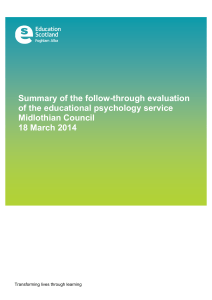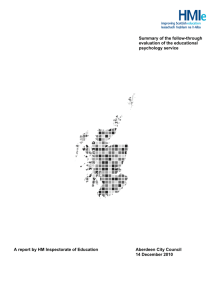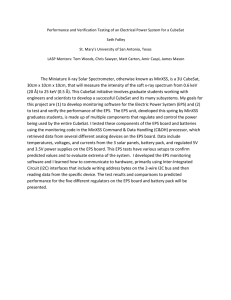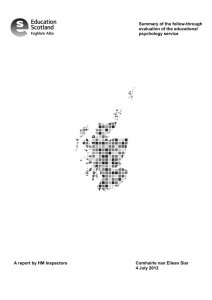Document 12964256
advertisement
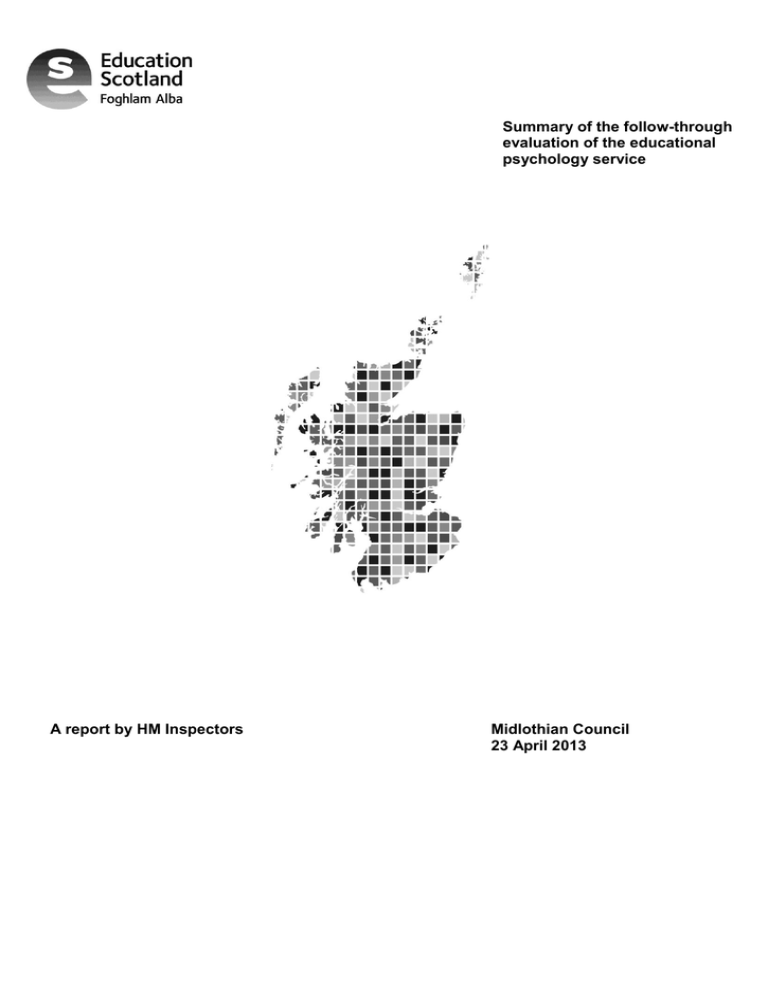
Summary of the follow-through evaluation of the educational psychology service A report by HM Inspectors Midlothian Council 23 April 2013 Page 1. The inspection 1 2. Continuous improvement 1 3. Progress towards meeting the main points for action 2 4. Conclusion 3 How can you contact us? 1. The inspection HM Inspectorate of Education (HMIE) published a report on the inspection of Midlothian Council Educational Psychology Services (EPS) in June 2010. Some time after the inspection the service prepared an action plan indicating how they would address the main points for action identified in the original HMIE inspection. An interim report on the service’s progress was published by HM Inspectors of Education in September 2011. HM Inspectors (HMI) revisited the service in February 2013 to assess the extent to which the EPS was continuing to improve the quality of its work, and to evaluate progress made in responding to the main points for action. During the inspection, HMI worked in partnership with the Education and Children’s Services Division (ECS) and the EPS on a carefully-planned programme of activities. These were designed to engage a range of stakeholders, deepen the service’s knowledge of itself and to promote organisational learning. 2. Continuous improvement The initial inspection report identified concerns about the way the service was led and managed and its links with ECS. The interim report published in September 2011 indicated that progress with planning for improvement had been limited since the original inspection. Further changes to the leadership and management of the EPS have taken place since the interim report. These include the appointment of a permanent Principal Educational Psychologist (PEP) who took up post in January 2013. The line management of the service is in the process of transferring from the Head of Service (Children and Families) to the Head of Service (Education). The entire EPS team is in the process of transferring from two locality bases to a central location within the Council. This will increase the potential for the service to raise its profile and to ensure consistency of practice. The EPS has strengthened its approach to carrying out its core functions. It has developed its portfolio of training programmes and works collaboratively with partners to deliver well-targeted support to schools and others. Educational psychology research is now used more frequently to inform decisions about individual children. This helps to ensure that planned interventions are based on appropriate evidence. Partnership working by the EPS continues to improve. This helps to ensure that the work of the EPS complements other professions to identify agreed actions to improve the life chances of children and young people. 1 The EPS is becoming more involved in the strategic planning and development of ECS. The service continues to be viewed more positively by stakeholders. Data from self-evaluation activities is beginning to demonstrate high levels of satisfaction with the EPS in terms of ease of access to psychologists and working relationships. 3. Progress towards meeting the main points for action The initial inspection report published in June 2010 identified three main points for action (MPA). HMI confirm that the service has made further progress in addressing the MPAs. It is too early to determine the impact of this progress on children and families. Link self-evaluation to planning for improvement through leadership at all levels and partnership working with key stakeholders. The EPS has strengthened its arrangements for gathering feedback from service users. A Quality Improvement Framework Calendar is now in place and the recently appointed PEP continues to refine and improve this. She has amended the calendar to ensure that it includes, as a matter of routine, an evaluation of the quality of casework being carried out by educational psychologists. A helpful Performance Management Framework is now in place and is helping to support staff to deliver a more consistent service. The PEP has improved the stakeholder reference group by extending its membership to include parents. This helps to ensure that parents who use the service now have the opportunity to influence its development. Educational psychologists recognise that it is important for them to share with the PEP the responsibility for improving the service. They are aware of the need to demonstrate individual and collective leadership in their work. Doing so will strengthen teamwork and help the service to realise its potential to contribute to better outcomes for Midlothian’s children and families. Develop the EPS policy framework to guide practice within and across locality teams and ensure understanding of roles and responsibilities across stakeholders. The EPS has worked with partners to develop further its range of policies and practice guidelines. Arrangements are now in place to review policy documents annually to ensure that they reflect current developments within educational psychology. This is supporting the service to improve the quality of its work. The creation and review of practice guidelines is now more carefully monitored. The Access and Delivery of Service policy guideline is helping to promote a more consistent approach to service delivery. Data collected from schools indicates that they are supportive of the service’s current approach. There is scope for the EPS to develop and embed a coherent system to record the voice of the child and young person to ensure that service delivery is targeted more effectively to meet their needs. 2 Collect and analyse service and authority data to measure trends over time to demonstrate improvements in performance for children and young people. There is now more evidence of data collection and analysis by the EPS and the service has strengthened its link with the Performance and Planning Team. This is helping it to identify the aspects of the Council’s strategic priorities where educational psychologists can make the most difference. Examples include reducing the number of school exclusions and raising levels of attendance. Arrangements have been made to utilise the skills of the senior educational psychologist to develop strategies to analyse service and authority data to demonstrate the impact of the EPS. There is scope to build on the promising work which the PEP has established with Associated Schools Group Managers to improve further the effectiveness of planning for multi-agency interventions. 4. Conclusion The EPS has undergone further changes in personnel and line management since the interim inspection report. A permanent PEP has recently been appointed to the service and she articulates her vision for the service very clearly. She has quickly gained the confidence of educational psychologists and ECS and has made early improvements to the leadership and management of the service. She demonstrates a determination to embed a culture of self-evaluation and continuous improvement. With the continued support of ECS, the EPS has the potential to deliver educational psychology of a high standard and make a significant contribution to the Council’s agreed outcomes. Overall, the impact of improvements made since the initial inspection is yet to be fully realised. ECS and the EPS have been asked to prepare an action plan outlining the steps they intend to take to accelerate and embed improvements in the performance of the EPS. The link HMI and Area Lead Officer will maintain contact with ECS to support improvement. We will carry out a further visit within one year to report on progress with the MPAs and the extent to which improvements in the leadership and management of the EPS have been developed. The findings from this follow-through visit will be shared with the Local Area Network as part of the Shared Risk Assessment process. Clare Lamont HM Inspector 23 April 2013 3 If you would like to find out more about our inspections or get an electronic copy of this report, please go to www.educationscotland.gov.uk Please contact us if you want to know how to get the report in a different format, for example, in a translation, or if you wish to comment about any aspect of our inspections. You can contact us at enquiries@educationscotland.gsi.gov.uk or write to us at Education Scotland, Denholm House, Almondvale Business Park, Almondvale Way, Livingston EH54 6GA. Text phone users can contact us on 01506 600 236. This is a service for deaf users. Please do not use this number for voice calls as the line will not connect you to a member of staff. You can find our complaints procedure on our website www.educationscotland.gov.uk or alternatively you can contact our Complaints Manager, at the address above or by telephoning 01506 600259. Crown Copyright 2013 Education Scotland 4

